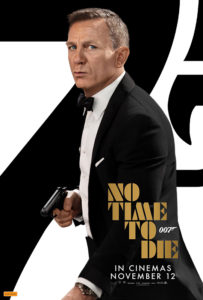Few tentpole films have suffered more from the privations of the last two years than No Time To Die, which has been slated and reslated so many times that one could have been forgiven for thinking it would never see release. Star Daniel Craig, famous for his exhaustion with the productions, had to follow the promotional trail far longer than any mere multimillionaire actor should reasonably be expected to. Somehow not the Craig Bond film burdened with the most meta-narrative (a title owned by the largely forgotten Quantum of Solace, brung low by industrial action), No Time To Die is nonetheless the end of an era: Craig's swan song, a Bond vehicle that hits so many of the right notes that the ones it muffs are both glaringly obvious and largely forgivable.
Five years after driving off into the sunset in Spectre, James Bond (Craig, Knives Out) finds himself drawn back into the game when an experimental bioweapon is stolen. Once again grappling with his possibly justifiable trust issues, Bond follows the trail to one Lyutsifer Safin (Rami Malek), whose motivations are as multifarious as they are semi-coherent.
Written by Bond stalwarts Neil Purvis and Robert Wade, credited on every Bond film since the World is Not Enough, with additional work done by director Cary Joji Fukunaga (TV's Maniac)and Phoebe Waller-Bridge (TV's Fleabag), No Time To Die is a punchily scripted journey to the centre of 007. The script plays on the more fun elements of the modern era, like the dysfunctional family unit formed by Bond, Moneypenny (Naomie Harris) and Q (Ben Whishaw), while leaning heavily on its ambivalence towards Ralph Fiennes' M.
The most heavily serialised quintet in Bond history, No Time To Die asks viewers to recall the broad strokes of the last fifteen years and to wonder if Eva Green is being handsomely rewarded for the use of her likeness. For a series that had hitherto fore only required the consumer to recall individual letters — and not even what they stood for — it's a leap, but for all of the world threatening that goes on, these are ultimately character studies. The strength of Craig's tenure is that he's not a replaceable cog in a blockbuster machine, but its most essential element; gone though his two handers with Judi Dench may be, Craig makes this last pair of films entirely his own.
This is why Malek's anaemic Safin isn't worth worrying about: his pathetic schoolboy motivation, his questionable choice to return Orientalism to the franchise (because that was what we've been missing since Die Another Day's flirtation with white face), the suspicion that Malek only takes roles that demand prosthetic teeth since they won him that Oscar; he can't stop the juggernaut that is the full force of a focused James Bond.
Fukunaga brings visual flair to the film in a way that goes beyond merely framing the unlabelled European vistas in an appealing way; with Director of Photography Linus Sandgren (The Nutcracker and the Four Realms) behind the camera, each shot is striking, and narrative and action flow coherently. Fukunaga has a natural feel for set pieces, including a motorcycle chase that transitions into an Aston Martin demolition derby, and a memorable shoot out in Cuba with special guest star Ana de Armas (The Night Clerk). No Time To Die is frequently exhilarating and, crucially, logical.
The only part that doesn't quite work visually unsurprisingly relates to Safin, in that he has a free floating Japanese fusion aesthetic and his main chamber looks directly cribbed from a Villeneuve film circa 2017. It doesn't extend to his base as a whole, which is a fascinating Soviet era missile launch site — and classic Bond.
That's the secret to a franchise that has been referring to itself as dinosaur since at least 1995: No Time To Die, like most of Craig's tenure, emphasises the good and jettisons much of the bad. A side effect of this is at this point Bond appears to have swapped womanising for alcoholism, but at the very least he has someone to drink with. Franchise newcomer Hans Zimmer (Wonder Woman 1984) adds a score that sounds quintessentially Bond, not least because of the judicious sampling of one of the paradoxically more iconic and obscure Bond themes.
No Time To Die sets a table for a world without Daniel Craig in it, but there are mixed messages as to where precisely the series will go next. While it's impossible to see the shape of the future, in No Time To Die we can process not just 15 years of Craig in the role, but a surprisingly affecting tribute to more obscure corners of the franchise. If you have no investment in James Bond or 007, No Time To Die works as a strikingly well shot action film with all of the car chases and explosions one could ask for; for the devoted, it's a satisfying end to an era.
No Time to Die opened in Australian cinemas on November 11, 2021.
Directed by: Cary Joji Fukunaga.
Starring: Daniel Craig, Rami Malek, Léa Seydoux, Lashana Lynch, Ben Wishaw, Naomie Harris and Ralph Fiennes.

